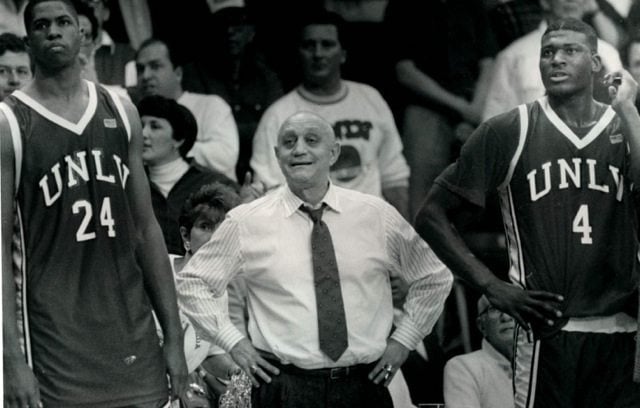Two Basketball Legends leave different legacies in college basketball
February 2015 will long be a dark month in the history of college basketball, for it was then that the game lost a pair of coaching icons.
Dean Smith died first after a long battle with dementia. The legendary University of North Carolina coach, who mentored the likes of Michael Jordan, Sam Perkins and James Worthy, passed away on Feb.7.
Four days later, former University of Nevada, Las Vegas coach Jerry Tarkanian died after battling cardiac and respiratory problems in recent months.
Smith and Tarkanian, who had coaching stints at Long Beach State, UNLV and Fresno State after time at Riverside Community College and Pasadena City College in Southern California, both coached during the turbulent 1960s when racial tensions were boiling over.
Tark dared to start a predominantly black lineup at a time when the unwritten rule of college basketball stated that at least three of the five players on the floor at any given time had to be white. That certainly wasn’t the only rule that Tarkanian would allegedly break during his illustrious coaching career at Long Beach State, UNLV and Fresno State.
Tark the Shark, as he would become known, was Public Enemy No. 1 for the NCAA, for his alleged shady recruiting practices. Some were proven while others were not.
Tarkanian had the reputation of a robber baron, but his players and fans loved him and his up-tempo run-and-gun offense made the Runnin’ Rebels one of the most entertaining teams to watch during parts of three decades.
His coaching career had humble beginnings. He began coaching at the high school level at San Joaquin Memorial High School, an athletic powerhouse and Catholic high school in Fresno. He later coached at Southern California’s Antelope Valley High School in the Los Angeles desert suburb of Lancaster.
From there, he went on to enjoy a brief but successful run at Pasadena City College and Riverside Community College, where he won three California Community College State Championships.
He won 700 games and transformed UNLV from “Tumbleweed Tech” to a national powerhouse. He was an innovator and changed the game during the turbulent 1960s, but even with all that, a dark cloud followed him into the history books.
Like Tarkanian, Smith coached during the height of the Civil Rights Movement, and, like Tark, he gave unprecedented opportunities to black players. The first black player to receive a scholarship at UNC, Charlie Scott, played for Smith, who later went on to win the 1976 Olympic Gold Medal and coach greats like Jordan, Worthy and Perkins, among others too numerous to be accounted for here.
Smith won a pair of NCAA Titles in 1982 and 1993 and retired as college basketball’s winningest coach with 879 victories, a mark that since been broken by Mike Krzyzewski and Bob Knight.
Both Tarkanian and Smith are Hall-of-Fame coaches. Both were winners and both changed the face of college basketball, but that’s where the similarities end.
While Tark’s career will be forever shrouded by the cloud of bending and breaking rules, the same will never be said for Smith, who inherited a renegade program in Chapel Hill plagued by recruiting and point shaving scandals under Coach Frank McGuire.
Smith promptly cleaned things up at UNC and turned the Tar Heels into honest winners. He coached the game the right way, although some of his critics still blast him for his four-corner stalling offense that led to the shot clock in college basketball.
He coached baseball and golf at the Air Force before spending nearly three decades at UNC. He played at Kansas under the legendary Phog Allen, under whom he was also an assistant coach.
Smith shocked the basketball world by retiring following the 1997 season, citing the fact that he no longer had the same passion for the game.
He could’ve gone on a farewell tour, but shunned that idea by saying “Do I really want Mike Krzyzewski to give me a rocking chair?”
Smith and Tarkanian both cast long shadows over the game, but they leave different legacies. Both, however, were legends in their own ways.







